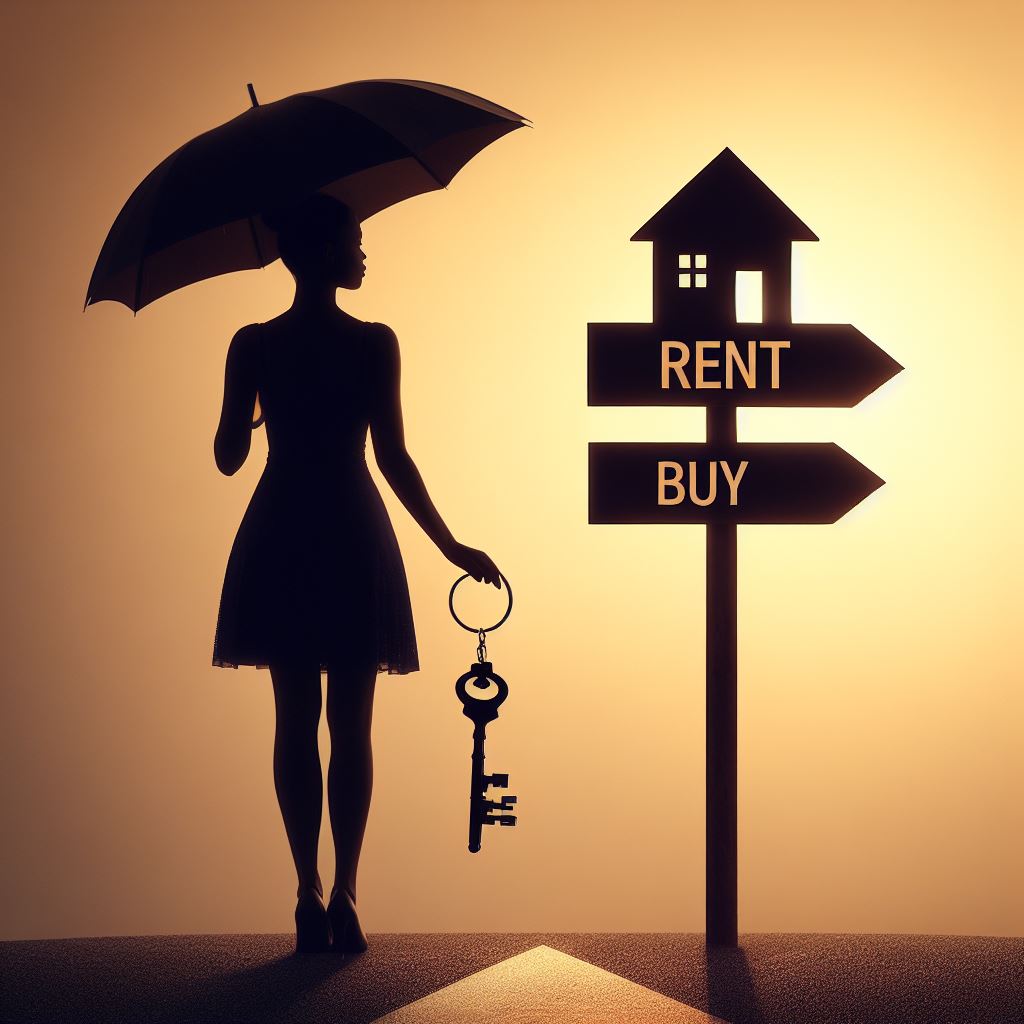Owning a home is not always better than renting. In fact, we demonstrate that in especially hot housing markets like Toronto’s, renting is far cheaper than buying. This is true even when considering moderate future price increases. The example uses the rent vs buy calculator and is based on a 1-bedroom apartment I was trying to decide between buying or renting.

Buying your first home is the single biggest financial decision you will make. Society expects this step in life because it’s considered a sign of financial success. However, this really should be your decision and a financial and personal decision after all. A financial decision means that we’re considering all the costs and the benefits associated with owning and renting a home as well as considering the opportunity costs. Deciding whether or not to own is not always a financial decision, sometimes you would want to move to an area you are only able to buy-in. The reason why I’m stressing the financial part is that it’s the part that’s most overlooked.
In this post, we will go through the rent vs buy calculator published by the New York Times. We will talk about some of the assumptions and considerations as well as the pros and cons of owning and renting. The scenario used in the calculation below is based on living in Toronto, one of the most expensive metropolitan centers in North America. However, the principles and logic are useful regardless of location. I’m hoping that my analysis will help others get their results out of the rent vs buy calculator.
Millennials value homeownership but need to pay special attention to the financial aspect
Millennials have been driving the housing market in Canada and the United States for some time now. For example, I am 31 years old and I belong to the millennial genus. I am trying to decide between renting or buying a condo with the same features; location, quality, and square footage. This point is important because it allows for a like-to-like comparison. That’s because I’m not interested in upgrading my standard of living, I’m only interested in knowing whether or not renting is cheaper than buying.
Another calculation can be done on whether or not going from renting an apartment to buying a house as an investment is a good financial decision.
The Rent Vs. Buy Calculator
Factors considered in the analysis
There are various categories of costs included in the rent vs buy calculator. From what I have seen, there is consistency in the variables included among rent vs buy calculators. The calculator works by trying to find the break-even rent, or in other words the rent in which renting or buying is equal in costs. Many homeowners or potential homeowners only look at the mortgage payment when considering the costs of ownership vs rental. However, cash flow analysis is needed for all the costs and the benefits associated with owning and renting. A good financial advisor would guide you through this process before buying a home.
The calculator we are using in this post includes a comprehensive list of costs and variables:
- Home price
- How long you plan to stay
- Mortgage details: Mortgage rate, down payment, and length of the mortgage
- What the future holds: Home price growth rate, investment return rate, and inflation rate
- Taxes: The property tax rate and marginal tax rate
- Closing costs: Cost of buying a home and the cost of selling home
- Maintenance and fees: Maintenance renovations homeowners insurance additional monthly utilities almond fees and common fees deduction
- Additional renting costs: One-month security deposit, broker fee, renters insurance
The length of stay is one of the most influential variables in this calculation. For this reason, experts do not recommend owning a home for a period of lesser than 5 years. The longer we intend on keeping the house, the more financially viable it is to own. This depends largely on someone’s family situation as well as their career goals. Owning a home can restrict your ability to take advantage of job opportunities elsewhere.
Some variables included are familiar and depend on your situation. Other costs are not as easy for a typical consumer to take an educated guess on. This includes the home price growth rate, investment return rate, and the inflation rate, which are macroeconomic related variables. We will expand on these variables a bit more below.
Home price growth rate
This is probably one of the most difficult variables to predict or forecast and it’s very specific to the region you live in. Toronto price increases as mentioned earlier have been way above increases in income. Therefore, this trend is not expected to continue, based on fundamentals. I expect prices to keep up with inflation plus some factor for real price growth (in addition to inflation) of 0.5%. This is especially generous since the recent increases are not quite in line with fundamentals and means that the condo market could be overvalued. In the GTA, the ownership costs as a percentage of median household income have grown from 40% in 2001 to about 70% in 2017. This means in Toronto, ownership costs have nearly doubled relative to income over the last 20 years.
Investment return rate
The investment return rate would be your opportunity cost for not paying your debt OR investing in a portfolio of stocks and bonds or even a business you wanted to start. The down payment and subsequent amounts could have been invested or used to pay down loans.
Since I have student loan debt, my opportunity cost, after all, is the interest rate on my loan which is 3.2%.
If you currently don’t have debt then I suggest you use the expected return on your investment. For example, a 50/50% portfolio allocation between stock and bonds is considered a balanced portfolio and carries a moderate amount of risk. You can decide which kind of portfolio or investment strategy better suits you by clicking here.
Inflation rate
The inflation rate reflects the general increase in prices in the economy. In Canada, we can assume that the inflation rate is going to be the target set by the Bank of Canada, which is 2%. This would be the long-term assumption and fluctuations may occur in the short-term. The Federal Reserve in the U.S. also targets 2% inflation.
Rent growth rate
Some jurisdictions have rent control and limit the annual increases in rent. I live in Ontario, where rental properties built before 1990 are subject to rent control. This sets a limit on annual increases to rent. From my experience, this limit has been set around the rate of inflation, so I would use the same assumption as the inflation rate, which is 2%. However, the actual increase will depend on your landlord. For example, some landlords may choose to keep the rent the same from year to year to entice a good tenant to stay.
Let’s get right into the calculation
Below is a full list of all the variables being considered in the calculator alongside what my assumption is and the rationale for the chosen value. Some of the rationale included are already discussed elsewhere in this article. Sources for the information are also available as links in the rationale section to serve as guidance and help you find information that’s more relevant to you.
The Result
The results of the calculation suggest that for the purchase of a $731k condominium and if I expect to live there 5 years, it makes more sense to rent if a similar place is available for $2,653 a month or less. This means that the break-even point between renting and buying is the $2,653 rent per month. I found an apartment that was $1,800 so I would save $853 a month by renting vs buying the same condo or apartment.
Can I afford this home?
Down Payment & Other Costs
One question someone needs to ask before buying a home is whether or not they have the minimum required down payment AND all other initial costs. In this example, the minimum payment is $58k but there is also an additional cost of $21k for realtor fees.
Recurring costs
Even if buying a home makes sense from a financial standpoint, a hard look at your budget before and after owning a home is needed. Recurring costs are higher when owning a home vs renting. Over the 5 years, I intend to stay, owning a home has a total recurring cost of $302k, while renting has total recurring costs of $167k. Owning would double the pressure on my budget, forcing me to make significant sacrifices.
The pros and cons of renting and buying
There are pros and cons associated with this decision and someone may decide to purchase or not to purchase a home regardless of what the numbers say. Deciding to purchase a home may not be entirely a financial or investment decision. There can just be a preference for a certain area or even liking the freedom to renovate.
The Canada mortgage housing Corporation (CMHC) has a useful pros and cons list for renting vs buying to help consider other factors in the decision making process.
Key takeaways and considerations
Rent is not comparable to mortgage payments
People often compare mortgage payments to rent, but as we have seen above, there are 27 factors that should be considered in this decision.
Forget about the “fear of missing out” and focus on what matters
When markets are doing well, people see prices rising and see a need to partake. They fear they’ll miss out on the increases if they don’t invest today. This could also mean that their dream home could be more expensive in the future as a result of any further increases. In some areas, prices have been rising and incomes are not keeping up. Which means that it is unlikely that those increases will continue. So prudence needs to be exercised on the choice over the appropriate home price growth rate. History does not necessarily predict the future.
This decision also depends on what someone wants in life. Some people want to travel, some want to work as artists and others want to climb the corporate ladder and enjoy the stability of a career. Another question we can ask ourselves is which of the two increases our happiness more, owning material things or experiences?
The results of this calculation are always changing
The calculation is sensitive to inputs like home price, interest rate, future property value increase. The calculation is also volatile because we are working with a long time frame of up to 25 years. Consider doing multiple scenarios to address the uncertainty around your chosen values, or if you are not sure about your assumptions.
Conclusions
As of today, it doesn’t seem like a good financial decision to buy a condo. Buying a home should be a personal decision and not as a result of societal pressure. What we have learned through this analysis is that comparing rent to a mortgage payment is not accurate.
The results are very sensitive to small changes in some of the assumptions, this also means that the results for this calculation can change over time. There are instances when someone chooses to still buy a home on a more pros and cons basis.
This analysis will be updated regularly to reflect the most recent market trends.
Related Articles
Six common mistakes investors make
Trade volumes have skyrocketed over the last decades and since investors from all skill and awareness levels are joining the market, understanding investor psychology is increasingly necessary. Advances in technology have eliminated the obstacles to entry for new investors.
Home ownership, a policy blunder
Housing is an important issue today and will probably remain so for the foreseeable future. Governments would have to implement land policies and create incentives. I would gear those incentives towards providing housing options by supporting the rental market. Creating options where the market has not provided can restore balance.
Money saving tips and tricks for the COVID-19 pandemic
Planning and being patient, establishing proper habits, actively seeking savings in your regular expenses are themes drawn from the list above. This pandemic can teach us a thing or two and leave us with valuable lessons learned.


